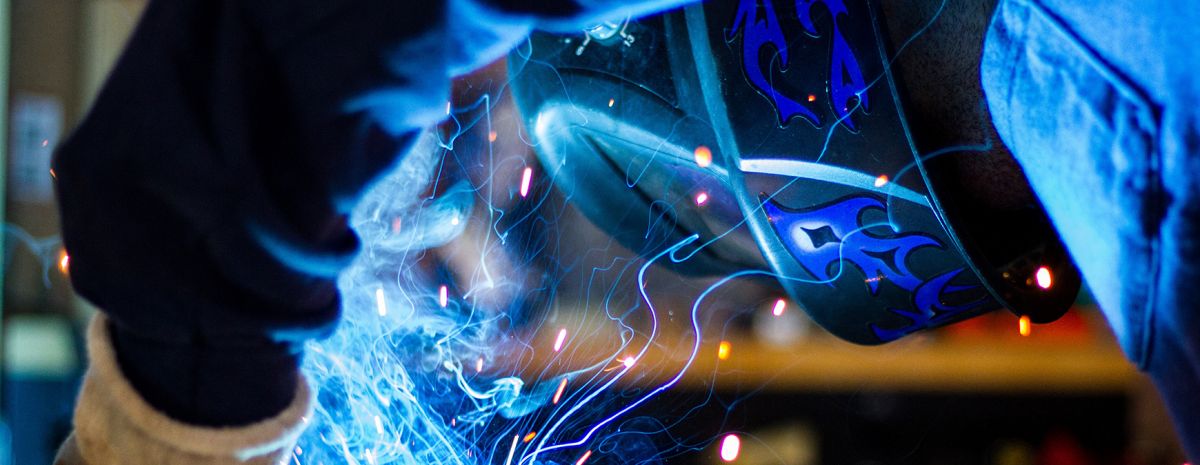
With uncertainty and unpredictability dominating discussions about the U.S. economy, many workers may be concerned about the security of their positions.1
Whether you’re currently in the welding field or considering a welding training program, you may be wondering how the current economic situation could impact your job prospects.
Is welding a good career for the future?
In this article, we’ll take a deep dive into what the future might hold for welders.
There’s a Growing Need for Welders
Many signs point to a promising future for welders. The Bureau of Labor Statistics expects to see 3% growth between 2019 and 2029 for the employment of welders. This could translate into the addition of 13,600 jobs within the next 10 years.2
Plus, 36% of welders in the U.S. were aged 45 or older in 2020, reports the BLS. This means older workers could be leaving the job market for retirement in the near future. The void they might leave behind could result in a heightened need for younger, newly trained welders.3
Have You Considered a Career in the Skilled Trades?
Fill out the form to recieve a no obligation info packet.
Where Is the Need for Welders Coming From?
Cities and small towns throughout the country reportedly need to improve their infrastructure. Railways, bridges, roads, drinking water systems, airports, state and federal buildings and other critical infrastructure are in need of replacement or repair.4
In fact, it’s estimated that over $2 trillion in funding will need to be invested in modernizing the nation’s infrastructure by 2025 alone.5 While many solutions have been discussed, such as increased public-private partnerships, more federal spending or an infrastructure bank, this focus on rebuilding infrastructure could mean increased job security and longevity for welders and many other skilled trades workers.2,5
Another contributing factor to the need for welders is the growth in manufacturing in the U.S.6 An industry that has been plagued by low output and a decreasing labor force in the past has been experiencing a resurgence in recent years. This turnaround is due to a variety of factors including supportive tax policies, advantageous energy and transportation costs and enhanced workforce quality.6
The U.S. gross domestic product (GDP) is largely dependent on manufacturing fields and professionals, including welders. In the third quarter of 2020, the manufacturing industry contributed to 11% of the country’s economic output.7 To put it in perspective another way, welding plays a critical role in the creation of over half of manufactured U.S. products.8
What about during the pandemic? In March 2021, manufacturing employment increased by 53,000. Durable goods sectors had some of the highest job growth.9
How to Prepare for a Future in Welding

The future projections for welding jobs are encouraging. So, what steps can you take to prepare for a career in welding?
Be Willing to Relocate
As mentioned before, manufacturing and construction are two major fields that are seeing an increased need for welders. Since these opportunities are present across the country, job prospects may be better for those with a willingness to relocate.2
Undergo Welding Training
There can be a correlation between a welder’s skills and his or her job security. Those willing to undergo training and earn a welding degree could have a competitive edge over those who don’t, further solidifying an already favorable career choice.2
Learn the Latest Welding Technologies
As with any field, new technologies are continually being developed.10 In order to stay ahead of other job applicants, it can be helpful to learn the latest welding technologies and processes.2
Welders Are Essential Workers
While a welding career might sound good on paper, how might it play out during the pandemic?
Fortunately, many welders are still able to ply their trade despite COVID-19-related workplace restrictions.11
In April of 2020, the Cybersecurity and Infrastructure Agency (CISA), a subgroup of the Department of Homeland Security, classified welders as essential workers. This ensures many welding projects can continue even when federal or local governments decide to enter into temporary shutdowns.11
According to the Advisory Memorandum On Ensuring Essential Critical Infrastructure Workers Ability To Work During The COVID-19 Response, workers who conduct services that are essential to “continued critical infrastructure viability” should be permitted to continue working.11
Construction and manufacturing workers are included in this group, which means welders might not have to worry about being barred from work should further shutdowns occur in the future.11
Join the Essential Welding Workforce
Are you interested in joining the ranks of America’s essential welding workforce? Reach out to a Tulsa Welding School rep today to learn more about training to become a professional welder. Call (855) 806-4921.
Additional Sources
1https://www.cnbc.com/2020/06/12/feds-economic-forecasts-are-all-over-the-map-a-sign-of-how-uncertain-these-times-are.html
2https://www.bls.gov/ooh/production/welders-cutters-solderers-and-brazers.htm#tab-6
3https://www.bls.gov/cps/cpsaat11b.htm
4https://bipartisanpolicy.org/policy-area/infrastructure/
5https://www.cfr.org/backgrounder/state-us-infrastructure
6https://www.brookings.edu/research/global-manufacturing-scorecard-how-the-us-compares-to-18-other-nations/
7https://www.thebalance.com/u-s-manufacturing-what-it-is-statistics-and-outlook-3305575
8https://weldinginsider.com/6-welding-industries/
9https://www.bls.gov/web/empsit/ceshighlights.pdf
10https://www.millerwelds.com/resources/article-library/the-latest-welding-technologies-can-save-time-and-money
11https://www.cisa.gov/sites/default/files/publications/Version_4.0_CISA_Guidance_on_Essential_Critical_Infrastructure_Workers_FINAL%20AUG%2018v3.pdf
This blog has been labeled as archived as it may no longer contain the most up-to-date data. For a list of all current blog posts, please visit our blog homepage at https://www.tws.edu/blog/




